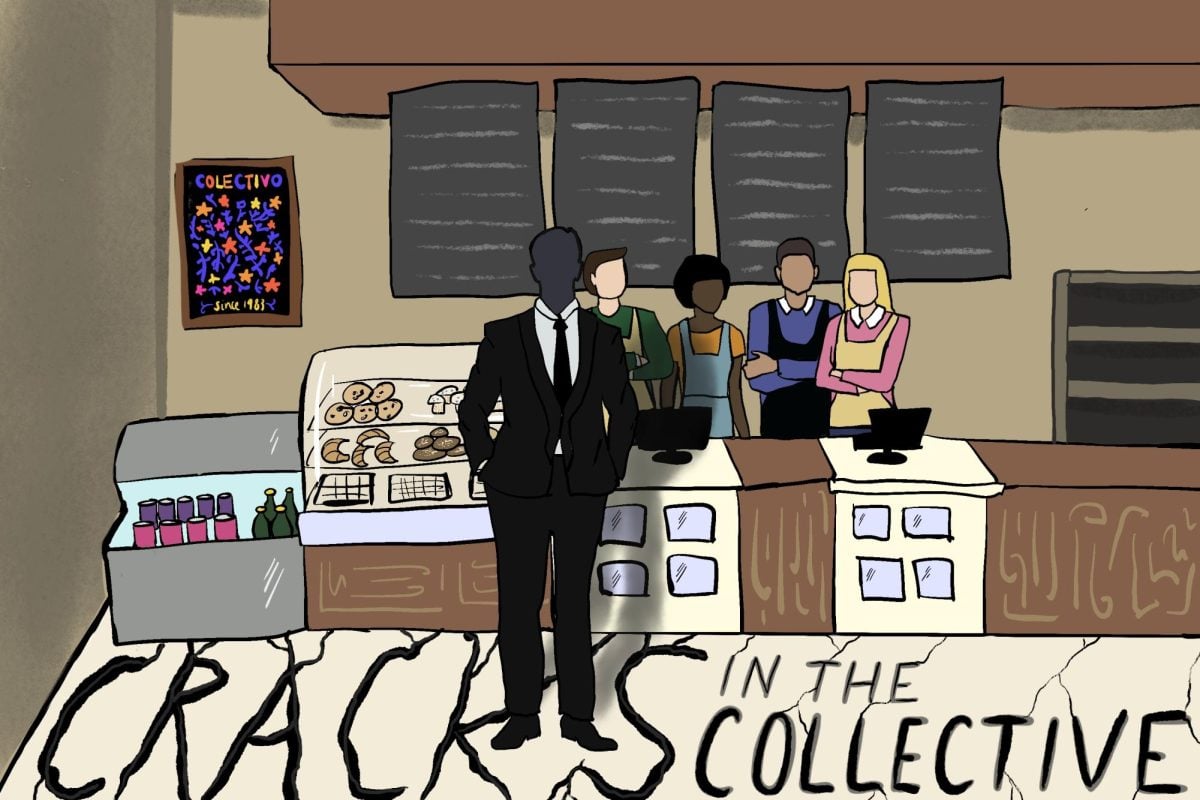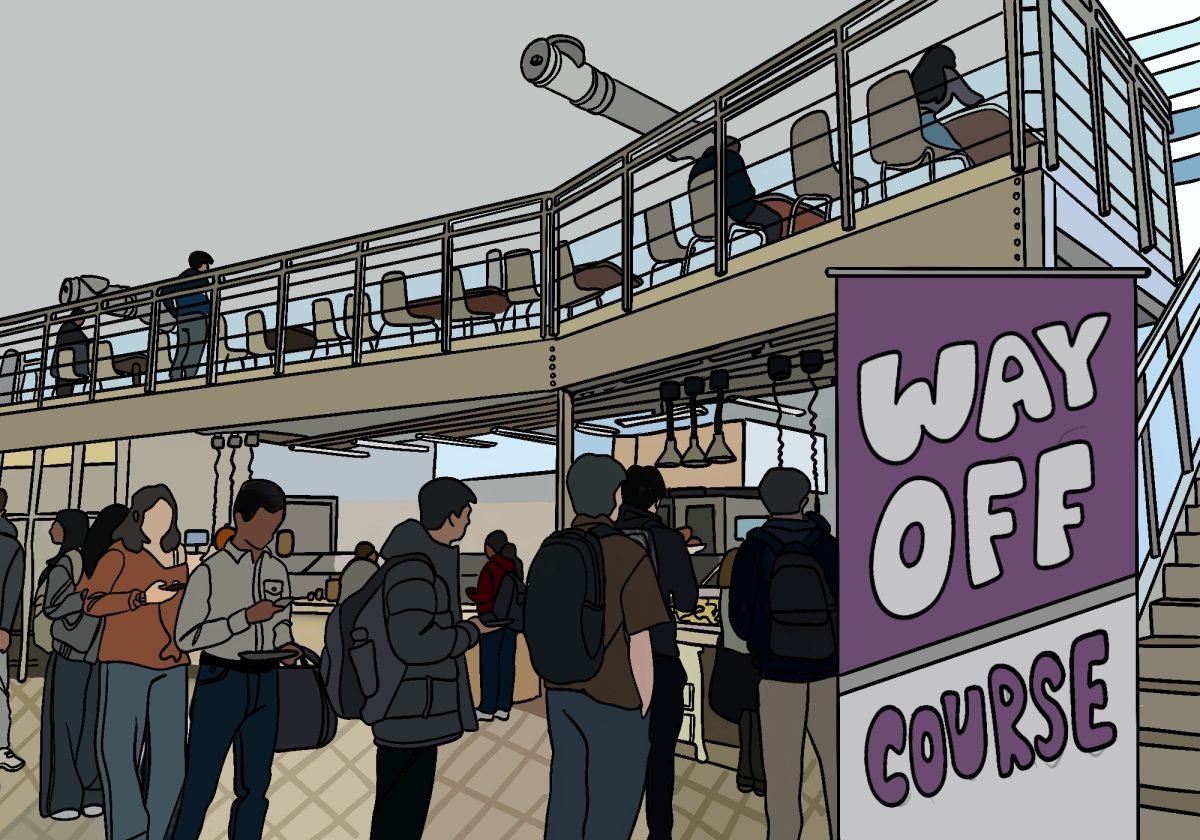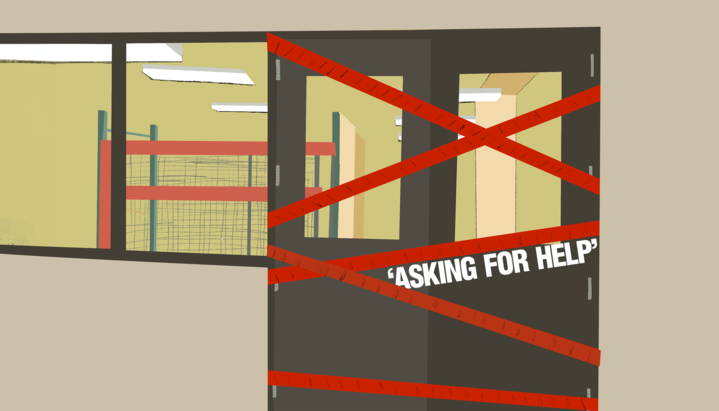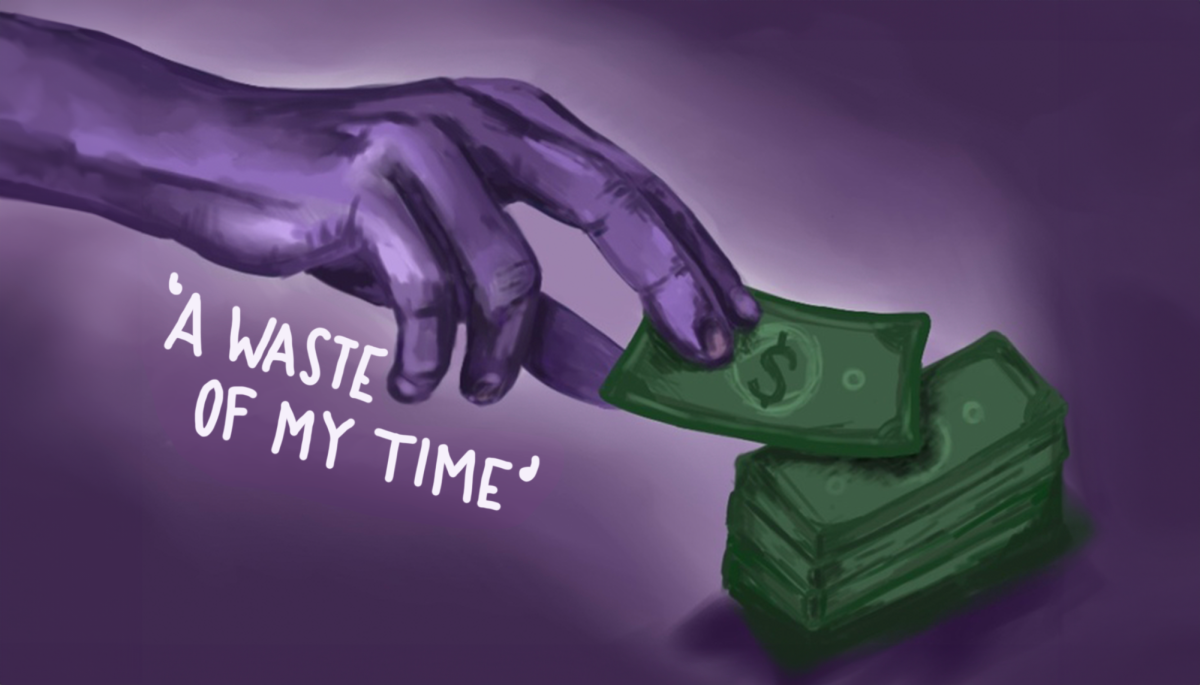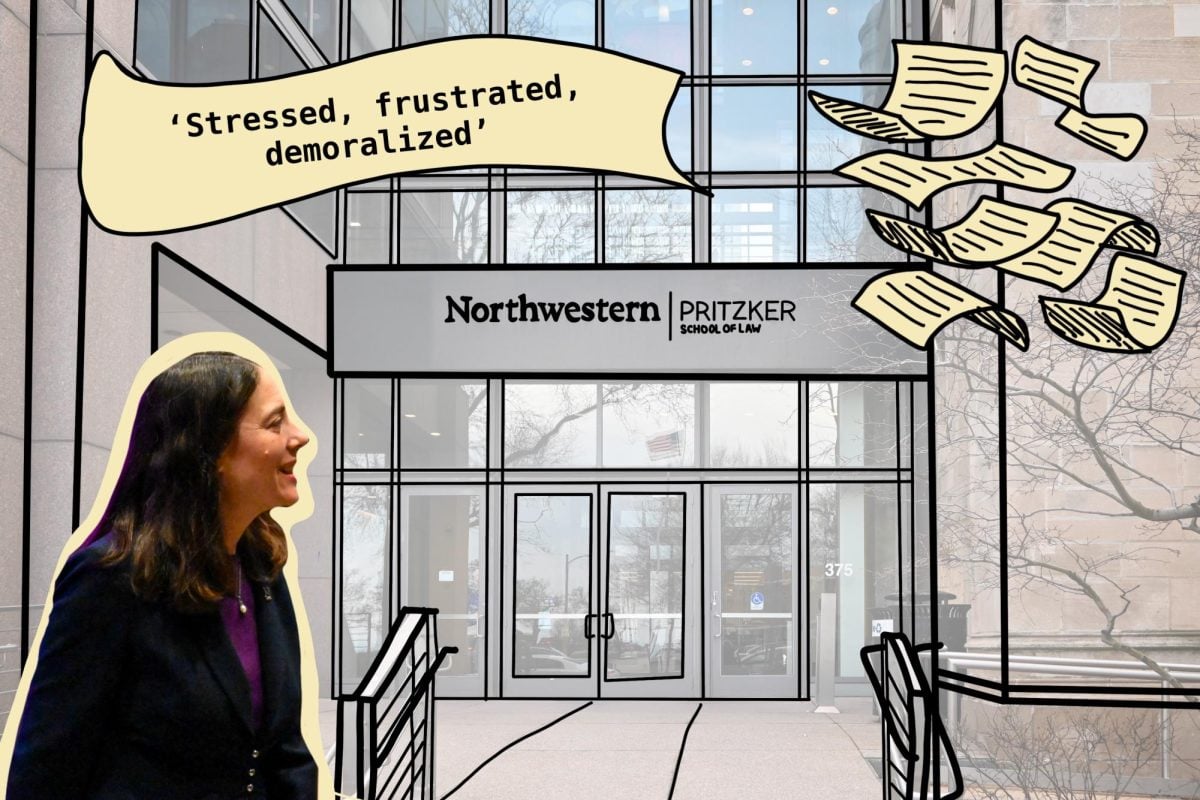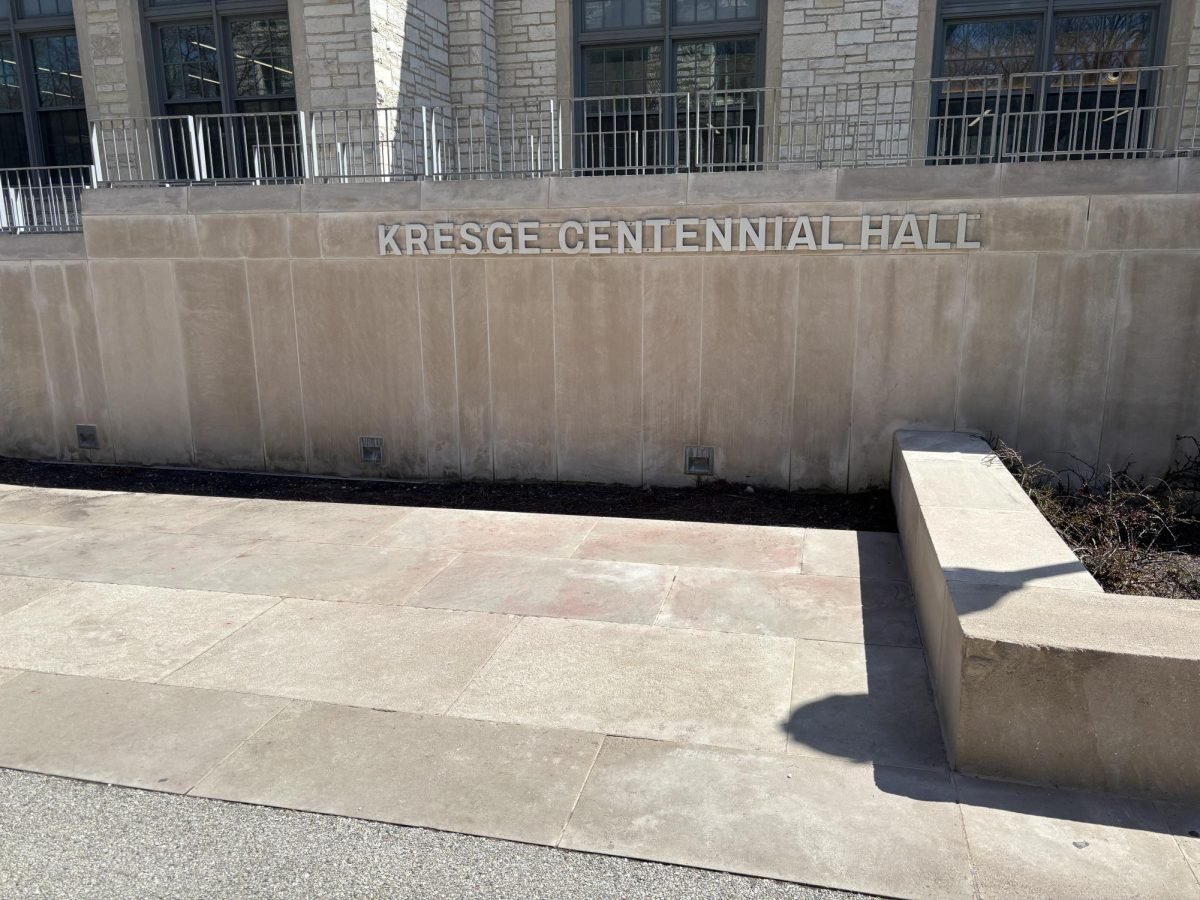This December, like many before, Rabbi Dov Hillel Klein led a group of Northwestern students on a Birthright trip to Israel.
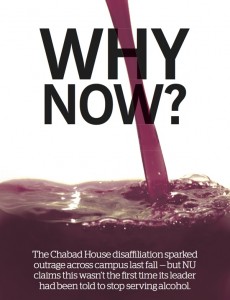
Sitting in the Tannenbaum-Chabad House in February, Klein explained how “amazing” the trip had been for the students who joined him. He was wearing a bright purple sweatshirt with a cartoon of his own face drawn on the back.
“I don’t wear it outside of here,” Klein joked. “But it shows you how much they embrace me.”
The rabbi, a campus figure since 1985, is now setting his sights on planning the next Birthright trip. But when he spoke with The Daily in September, he wasn’t sure if this would even be a possibility.
That month, Klein received a letter from the University that said he was no longer allowed to host Birthright trips per the University’s decision to disaffiliate with him and the Tannenbaum Chabad House. The University claims Klein violated NU’s alcohol policy by serving vodka and whiskey to minors at Shabbat. In a September interview with The Daily, Klein admitted that he had done so.
The University was unable to stop him from hosting Birthright trips because Birthright is funded through a private organization not affiliated with NU. But the disaffiliation has weighed heavily on other aspects of Klein’s involvement with students. He can no longer serve in a range of positions, from director of the Kosher food program to residential college fellow, or use campus property.
Lubavitch-Chabad of Illinois filed a suit on behalf of Klein and Chabad House in September claiming NU’s decision was a form of religious “discrimination.” In part, Klein’s defense rests on an Illinois law that makes an exception for underage alcohol consumption during a religious celebration or ritual, but it is unclear whether his actions qualify for that protection. The matter remains in litigation, and University spokesman Al Cubbage said a trial date was set for Jan. 27, 2014.
Chabad House’s doors remain open, and the organization is expanding. Klein said he has already raised more than $350,000 for a construction project he hopes to begin zoning in the spring. More than 800 students and community members have signed a petition calling the University to reaffiliate with Chabad House. Klein said alcohol has not been served at Chabad House — with the exception of small amounts of Kiddush wine — since the University first brought the matter to his attention in July. Many members of the Jewish community are asking, “Why now?”
But according to documents obtained by The Daily, this isn’t the first time Klein was told to stop serving minors. In a court filing, NU argues Klein was warned to stop providing alcohol at Chabad House in 2005, and a student served at Chabad House was transported to the hospital in 2001.
University President Morton Schapiro told The Daily this month he doesn’t believe the liquor served at Chabad House qualifies for the Illinois exception.
“I’m an observant Jew,” he said. “I’ve never seen the page where you drink shots of vodka.”
The case
Hours before Yom Kippur services began in September, Jewish students received an email from Klein announcing that the evening’s service at Norris University Center would be his last at NU.
Klein told The Daily that Patricia Telles-Irvin, the vice president for student affairs, first asked him to resign in July citing concerns he was violating University alcohol policy. Klein said he responded by immediately going dry at Chabad House. The University officially cut ties with Chabad House on Sept. 11.
Acting on behalf of Chabad House and Klein, Lubavitch-Chabad of Illinois filed a discrimination complaint in federal district court against NU, Telles-Irvin and University Chaplain Timothy Stevens on Sept. 21.
“The University claims that it offers a wide variety of religious and community options but it is discriminating against Chabad House and the Jewish faith,” the complaint read.
An official response to the lawsuit from NU states at the July meeting, Telles-Irvin told Klein the University was concerned about alcohol being served to underage students, excessive consumption by students at Chabad and reports of Klein’s own “excessive use of alcohol” and “appearances in public in a state of intoxication.”
The University response also argues Klein has been approached about the issue before. In 2005, Klein met with William Banis, then-vice president for student affairs, after students arrived at residence halls intoxicated after spending time at Chabad House, according to the response.
The filing also states Klein met with Stevens to discuss underage drinking in both 2001 and 2005. In 2001, University Police responded to a student who had been transported to the hospital for “exhibiting significant signs of intoxication” after attending Chabad House. Stevens also addressed a family event Klein hosted in 2005 at a residential facility where alcohol was served without proper adult supervision, according to the filing.
At the 2005 meeting, the filing claims Stevens told Klein directly to stop serving alcohol. During the same year, “there was a report where shots of vodka and/or whiskey were provided to students of all ages attending the Friday night dinners.” The filing goes on to claim Klein was intoxicated at many of these events.
“Given the fact that this practice and behavior has not ceased after several attempts in the last 10 years to address the issue with Rabbi Klein … Northwestern University can no longer have an affiliation with the Tannenbaum Chabad House … while Rabbi Dov Klein is the representative of your organization,” Telles-Irvin wrote to Rabbi Daniel Moscowitz, director of Lubavitch-Chabad of Illinois, in a letter quoted in the filing.
Klein declined to comment on the allegations the University submitted in the filing.
“I can tell you everything the University has ever asked of Rabbi Klein, Rabbi Klein has complied with in full,” Moscowitz said.
New administrator, new action
Many in the Chabad House community are wondering why the University is choosing to disaffiliate now — especially if NU has known about alcohol being served at the house for more than a decade.
“I have no idea except that we have a new vice president,” Klein said in September.
Due to the ongoing litigation, Telles-Irvin has declined to comment beyond what she wrote in an email to Jewish students announcing the decision to disaffiliate in October.
Telles-Irvin officially filled the role of vice president for student affairs in summer 2011. Prior to working at NU, Telles-Irvin served as the vice president of student affairs at the University of Florida, beginning in 2004. Telles-Irvin told The Daily in 2011 she spent the “tail-end” of her tenure at Florida addressing binge drinking, a topic she said she planned to tackle at NU after gaining a better sense of campus culture.
The filings in the litigation show Telles-Irvin met with Klein in July to ask him to resign.
“As many of you know, the Tannenbaum Chabad House and Rabbi Klein have been a part of the University community for many years, and therefore, the decision to disaffiliate was not an easy one,” Telles-Irvin wrote in the October email to students.
She wrote in the email an NU investigation found Klein had violated University policy by serving alcohol to underage students and “excessive consumption” occurred at Chabad House.
The policies at play
NU alcohol policy states students are expected to follow Illinois state laws and campus rules concerning alcohol and other drugs. Although Illinois state law makes a provision for students to drink during a religious ceremony, the Student Handbook does not make a similar explicit exception. The policy was updated in the 2012-2013 Student Handbook to include that the University “regularly publishes a Policy on Drugs and Alcohol pursuant to federal mandates” that order “the creation and maintenance of academic and working environments free from illicit drug use and alcohol abuse.”
In the December preface of the Policy on Alcohol and Drugs 2012-13, Schapiro wrote the University’s alcohol policy was issued in 1989 to comply with the Drug-Free Workplace Act of 1988. That policy is listed in the Student Handbook. The regulations also appear in the faculty and staff handbook, he wrote in the preface.
Klein’s case argues Chabad House is being discriminated against because other groups on campus “had committed the same acts.” The Christian Eucharist, for example, involves wine.
A December Chicago Tribune article claims Klein’s defense will argue Schapiro serves alcohol, specifically wine, to students at his Passover dinners.
Schapiro told The Daily earlier this month students are carded at regular dinners at his home, but he was unsure of what the policy was for wine at his Passover dinners.
SESP sophomore Lizzie Kreitman attended Passover last year at Schapiro’s house, where she said both wine and grape juice were available. Kreitman said she believed students were held to an “honors system” when it came to drinking at Schapiro’s Passover dinner.
Schapiro cited the Illinois law making an exception for alcohol served during religious ceremonies. But he distinguished wine protected under this law from the hard liquor Klein served.
“It seems curious, though, to conflate serving wine in the context of a seder and doing shots of vodka,” Schapiro said. “Am I missing something here?”
Moscowitz argues that in Hasidic Judaism, a traditional form of Judaism that includes the Chabad movement, there is a tradition called a “Farbrengen,” in which alcohol is served. The term is Yiddish for “joyous gathering.” He also cited the tradition of the “L’Chaim.”
“Within the context of a Sabbath, holiday or life event, it is a toast to wish each other good life and great accomplishments,” he said.
Although these traditions exist in the Chabad movement, the Chabad on Campus International Foundation has formally forbid the service of alcohol to students under 21 — with the exception of Kiddush wine — for more than 10 years, said Rabbi Menachem Schmidt, the organization’s director. The organization goes even further in situations where a school’s policy is stricter than its own.
“If a university has a different policy, we go according to that university’s policy,” Schmidt said.
Schmidt said many Chabad Houses on college campuses only serve grape juice, and the policy does not make a special exception for “Farbrengens.” He directs the Lubavitch House at the University of Pennsylvania, where he said alcohol has not been served openly in more than fifteen years with the exception of Kiddush wine.
Jewish history at NU
NU is widely known as a university with an active Jewish life. In 2011, the University ranked 16th on a list of the top 60 private schools by Jewish student population on the Hillel website. According to the website, 1,600 out of about 8,000 undergraduates are Jewish, and the University offers approximately 35 Jewish studies courses, as well as a major and a minor.
But campus culture was not always this way. Until the 1960s, NU had a strict Jewish admissions quota policy.
Many at Chabad House have argued that the organization was influential in changing what some once called NU’s anti-Semitic culture.
“What it comes down to is Northwestern was not nearly as accepting of Jewish life as it is now,” said Matthew Renick, Chabad House’s student executive board president and a Weinberg senior, in September. Renick pointed to Klein’s work on campus as instrumental in changing the culture. “To take the frontrunner out of the picture, I don’t think that’s right.”
Matthew Altman (Communication ‘10) also served as the president of the Chabad House student executive board and supported Klein through petitioning the University. He said Klein’s contributions to the University were “wide and far-reaching.”
“His absence has been widely felt,” Altman said.
When Tannenbaum Chabad House first opened its doors in 1985 following a fierce legal battle with the Supreme Court, NU was very different, Klein said.
“I don’t think I would have known what anti-Semitism was back then,” Klein said. “I don’t think I felt it. But on the other hand, was Jewish life embraced? No.”
He said when he first came to campus, he did feel “hostility.” Students told him they did not write they were Jewish on their applications, and NU was behind its peer institutions in developing a Kosher food program, Klein said.
“You were in the closet as a Jew here,” he said. “Now, people walk and talk Jewish.”
Klein said his influence in creating a Kosher program and bringing it to campus in the early 2000s helped change that perception, signifying to parents that Jewish life was “vibrant” on campus. The change can be noted at the Chabad House Shabbat dinners, which initially were only attended by a few students and now typically host nearly 75.
Although NU’s religious climate has improved, Klein noted that during his tenure there were examples of anti-Semitism. In 2003, a swastika with the phrase “Die Jews” was painted in front of Norris.
Chabad House itself was the site of vandalism in 2010, when the arm of the large menorah outside the building was torn off during Halloween weekend. Evanston Police did not investigate the incident as a hate crime, although Klein believes it was.
“My feeling was, ‘How could it not be? It was a menorah,’” he said.
Following the vandalism, about 300 students attended a forum in Technological Institute, Klein said. Schapiro and Stevens both attended a menorah-lighting ceremony at Chabad House following the incident on Hanukkah. But Klein said he, not NU, was responsible for organizing the forum.
“I wasn’t waiting for the University to do something or create something,” Klein said.“It’s typically not done that way, at least when things happen in the Jewish community.”
The director of the Lubavitch-Chabad of Illinois said the University’s decision to disaffiliate “resurrects” this history. Although he said the University made strides by hiring Schapiro, a Jewish president, he finds it offensive that a known Holocaust denier, McCormick Prof. Arthur Butz, remains on faculty.
Butz, who joined the NU faculty in 1966, published a book titled “The Hoax of the Twentieth Century: The Case Against Presumed Extermination of European Jewry” in 1976, after he had gained tenure. He more recently gained media attention for supporting Iranian President Mahmoud Ahmadinejad’s statements that the Holocaust was a “myth.”
In 1997, former University President Henry Bienen released a statement saying Butz remained on faculty because of the University’s policy on “intellectual freedom.”
“Mr. Butz does not claim that his views are those of the University, and I emphasize again that they are not,” the statement read. “In addition, at no time has he discussed those views in class or made the issue part of his class curriculum. As a result, we cannot
take action based on the content of what Mr. Butz says regarding the Holocaust without undermining the vital principle of intellectual freedom that our policy serves to protect.”
Chabad House today
Students say Klein has done everything in his power to keep things as normal as possible at Chabad House despite the ongoing case. The most noticeable difference is that rather than wine or liquor, soda and juice fill the cups at dry Shabbat dinners. Klein also is no longer able to serve as the faculty adviser of the NU chapter of Alpha Epsilon Pi, but he remains one of three rabbis for the fraternity’s international organization.
Klein has found ways to continue many of the ministries he once performed on campus, now just a few blocks away in Chabad House.
Klein said the organization’s expansion is projected to cost about $500,000. He plans to put in an industrial kitchen, bathrooms and office space and make the building handicap accessible. He also said the project would improve the carpeting and wallpaper. In the wake of the 2010 vandalization, he wants to add shatter-proof windows on the first floor.
“There have been issues,” he said. “We want to make sure the premises is safe.”
The future of Chabad House
Despite the ongoing lawsuit, Klein said he hopes to one day reaffiliate with the University.
“I love Northwestern,” Klein said. “I’ve been committed here for 27 years.”
Although Klein is not allowed “to present himself as a member of the Northwestern community” per the disaffiliation, the sign outside of Chabad House still reads “Northwestern Jewish Center.”
“That is the original sign that has been there since 1985,” Klein said. “The University does not own the word ‘Northwestern.’”
And Klein made sure he was still there when NU remembered Alyssa — the Weinberg junior who died while studying abroad in the fall — with a candlelit vigil at The Rock last November. Before her death, Weaver had attended Shabbat dinners hosted by Klein. Due to the terms of the disaffiliation, Klein could not stand with the mourning students and faculty, but he still wanted to take part in the event.
“I drove and stopped on Sheridan (Road) and put down my windows and put my flashers on,” Klein said. “It was important for me to have a sense of presence there.”
Klein said he will continue his original mission to serve the Evanston-Wilmette Jewish community as well as the Northwestern community despite the “obstacles” the disaffiliation presents.
“I have a legacy,” Klein said. “I don’t say that with arrogance. I hope that will be able to move forward.”
That legacy has not persuaded the University to reverse its decision. In the letter to Moscowitz the University filed in the case, Telles-Irvin acknowledged his involvement in “many aspects of our students’ lives.”
“While he has been involved with our students in very important ways; unfortunately, none of that changes my conclusion given the serious ramifications for the University and our students,” Telles-Irvin wrote.
Correction: An earlier version of this story incorrectly stated McCormick Prof. Arthur Butz joined Northwestern’s faculty in 1996, when he in fact joined in 1966. This story has been edited to clarify Butz had tenure by the time his book was published in 1976. The Daily regrets the error.






